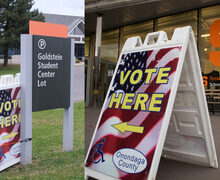‘Boys State’ directors, cast discuss democracy ahead of virtual screening
Courtesy of Apple
A virtual screening of the documentary “Boys State” will be held virtually on Tuesday at 7 p.m. for Syracuse University students, faculty and staff. It depicts an annual week-long event that brings 1,000 Texan teenage boys together to immerse themselves in a government education program.
The Daily Orange is a nonprofit newsroom that receives no funding from Syracuse University. Consider donating today to support our mission.
The documentary “Boys State” follows four teenage boys as they participate in the Boys State political competition that has been hosted by the American Legion since 1935. The annual week-long event brings 1,000 Texan teenage boys together to immerse themselves in a government education program in which they must build up two political parties — the Nationalists and the Federalists — and run for elected positions.
The film shows the four protagonists navigate through replicating the Texas government while also giving viewers a look into their thought processes in one-on-one interviews. The documentary won the Grand Jury Prize at the 2020 Sundance Film Festival.

Robert MacDougall (left) and Steven Garza (right) are two of the four protagonists in “Boys State.” Courtesy of Apple
A virtual screening of the documentary will be held virtually on Tuesday at 7 p.m. for Syracuse University students, faculty and staff. Apple Original Films and A24 are hosting the screening in collaboration with several on-campus organizations. A Zoom discussion with Student Association and College Democrats member David Bruen, who attended a Boys State program in New York, will follow.
Jesse Moss and Amanda McBaine, both directors and producers of the documentary, traveled around Texas for three months before the program began, interviewing members of the 2018 Boys State group. They were looking for “people who were politically sophisticated, smart, ambitious” to be the focus of their documentary, Moss said.
They found Benjamin Feinstein, Robert MacDougall and Steven Garza before the filming of the documentary and added the fourth subject, René Otero, during filming because of his ability to “command a room,” Moss said.
Garza runs for the highest-ranking position at Boys State and is seen as the “underdog” character, McBaine said. Garza wasn’t oblivious to the fact that he was being filmed, and this influenced him to be true to himself throughout the process.
“I knew I didn’t want to lie to myself,” said Garza, a student at the University of Texas at Austin. “I wanted to look back at this in 10, 20, 30 years and be proud of what I did there.”
Moss said that he and McBaine connected with Garza’s journey emotionally and that it kept them grounded throughout the filming process.
MacDougall, a cadet at the United States Military Academy at West Point, said he went into Boys State with a “very narrow, quite cynical mindset.”

(From left) Thorsten Thielow, Amanda McBaine, Patrick Bresnan and Daniel Carter created “Boys State.” The documentary took one week to film but a year to edit. Courtesy of Apple
He anticipated the overall opinions at the program to be right-wing and non-negotiable, causing him to run for governor of the Nationalist party on a platform of what he thought the people wanted to hear, not his actual opinions.
“You don’t have to lie to win all the time,” MacDougall said about what he learned from losing his gubernatorial run to Garza. “You don’t have to hide.”
MacDougall was amazed by how people from different socioeconomic, racial, religious and political backgrounds came together at Boys State and were able to agree on policy and legislation.
The documentary took one week to film but a year to edit, according to Moss. On the first day of filming, McBaine was worried they weren’t going to be able to pull an interesting documentary together. But once the Boys State participants were off trying to win elections and create policies for their parties, the filmmakers became confident in the storyline.
At the end of the day, my memory of Boys State doesn’t have cameras in them.Benjamin Feinstein, a protagonist in 'Boys State'
Moss hopes the film will continue to provide a space to talk about issues the U.S. faces. He wants people to “understand how much this film is not just about who we elect and how we elect,” he said.
For Feinstein, a student at Southern Methodist University, one of the best parts about getting to watch the documentary was revisiting an important experience in his life, he said.
“At the end of the day, my memory of Boys State doesn’t have cameras in them,” Feinstein said.
Published on September 28, 2020 at 8:52 pm
Contact Sydney: sabergan@syr.edu






